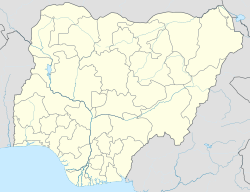Oju is a local government area in Benue State, Nigeria.[1] It borders Obi and Gwer East in the north, Konshisha and Yala in the east, Izzi and Ebonyi in the south, and Ado in the west. As of 2022, its total population is 243,300.[2]
Oju | |
|---|---|
| Coordinates: 06°51′00″N 08°25′00″E / 6.85000°N 8.41667°E | |
| Country | |
| State | Benue |
| Created | February, 1976 |
| LGA Headquarter | Oju |
| Government | |
| • Chairman | Hon. Ire Arubi |
| Area | |
• Total | 1,168 km2 (451 sq mi) |
| Elevation | 163 m (535 ft) |
| Population (2022) | |
• Total | 243,300 |
| • Density | 210/km2 (540/sq mi) |
| Language | |
| • Native | Igede |
| Time zone | UTC+1 (WAT) |
| Postal code | 971107 |
 | |
Geography
editOju is located on the southern edge of Benue State. The Oju-Alebo Road passes through the north of the area. Its average elevation is 163 meters above the sea level.[3]
Climate
editOju has a Tropical Savanna Climate (Aw). Over the course of the year, the temperature usually varies from 63 °F to 89 °F and is seldom below 57 °F or above 93 °F.
The rainy season of Oju starts in late March and ends in early November. It sees the most precipitation in September, with an average rainfall of 209 mm; and the least precipitation in December, with an average rainfall of 2 mm.
| Climate data for Oju | |||||||||||||
|---|---|---|---|---|---|---|---|---|---|---|---|---|---|
| Month | Jan | Feb | Mar | Apr | May | Jun | Jul | Aug | Sep | Oct | Nov | Dec | Year |
| Mean daily maximum °C (°F) | 30 (86) |
31 (88) |
32 (90) |
31 (88) |
30 (86) |
29 (84) |
28 (82) |
28 (82) |
28 (82) |
28 (82) |
29 (84) |
29 (84) |
29 (85) |
| Daily mean °C (°F) | 24 (75) |
26 (79) |
27 (81) |
27 (81) |
26 (79) |
25 (77) |
24 (75) |
24 (75) |
25 (77) |
25 (77) |
25 (77) |
23 (73) |
25 (77) |
| Mean daily minimum °C (°F) | 18 (64) |
20 (68) |
23 (73) |
23 (73) |
23 (73) |
23 (73) |
22 (72) |
22 (72) |
22 (72) |
22 (72) |
21 (70) |
18 (64) |
21 (71) |
| Average rainfall mm (inches) | 2.5 (0.10) |
9.7 (0.38) |
42.8 (1.69) |
92.9 (3.66) |
132.9 (5.23) |
163.5 (6.44) |
178.6 (7.03) |
192.6 (7.58) |
209.0 (8.23) |
164.1 (6.46) |
41.0 (1.61) |
2.0 (0.08) |
1,231.6 (48.49) |
| Average rainy days (≥ 1 mm) | 0.7 | 2.2 | 9.8 | 16.4 | 20.6 | 21.3 | 21.4 | 22.4 | 23.6 | 21.7 | 6.3 | 0.6 | 167 |
| Mean daily daylight hours | 11.8 | 11.9 | 12.1 | 12.3 | 12.4 | 12.5 | 12.5 | 12.3 | 12.1 | 12.0 | 11.8 | 11.7 | 12.1 |
| Source: Weatherspark.com[4] | |||||||||||||
Administrative divisions
editOju is divided into the following 11 council wards:[1]
- Ainu
- Adokpa
- Ibilla
- Idelle
- Iyeche
- Oboru Oye
- Oju
- Okpokpo
- Okudu
- Owo
- Ukpa
mineral Resources:
Oju Local Government Area has proven reserves of solid minerals like:
Limestone Precious stone Bauxite Coal Clay Zinc, and Salt
Agricultural produce:
The land is very fertile and about 80% of the inhabitants are farmers. Its rich and diverse agricultural endowment include: yam, rice, beniseed, guinea corn, oil palm, soyabeans, cassava, millet, maize, groundnut, and palm oil.
The economy is dependent on agriculture (food and cash crops) produced in commercial quantity.
The people of Oju are also involved in: Livestock keeping, Fishing, and Hunting
Religion:
Basically, there are two religions in Oju Local Government Area. The predominant Christianity on one hand and the traditional African religion on the other. The people of Oju are about eighty-five per cent (85%) Christians and about fifteen (15%) traditional worshipers.
Markets in Oju:
Oju currently has five market days, namely:
Ihigile Ihio Ihiobila Ihiejwo Ihiokwu
Notable People
editReferences
edit- ^ a b "Oju Local Government Area – I am Benue". Retrieved 2023-04-27.
- ^ "Nigeria: Administrative Division (States and Local Government Areas) - Population Statistics, Charts and Map". www.citypopulation.de. Retrieved 2023-04-27.
- ^ "Oju topographic map, elevation, terrain". Topographic maps. Retrieved 2023-04-27.
- ^ "Climate and Average Weather Year Round in Oju, Nigeria". weatherspark.com. Retrieved 2023-04-27.
